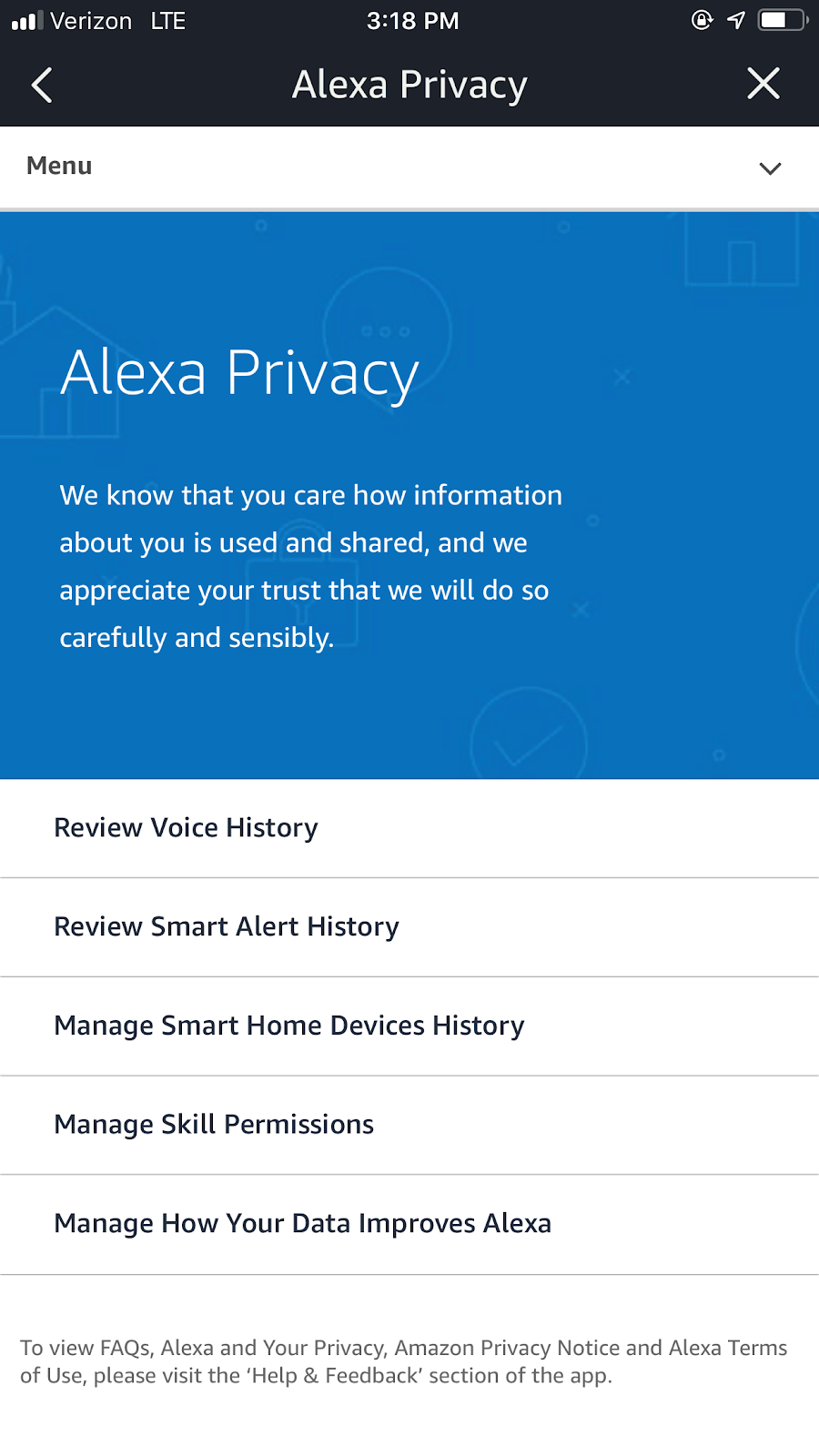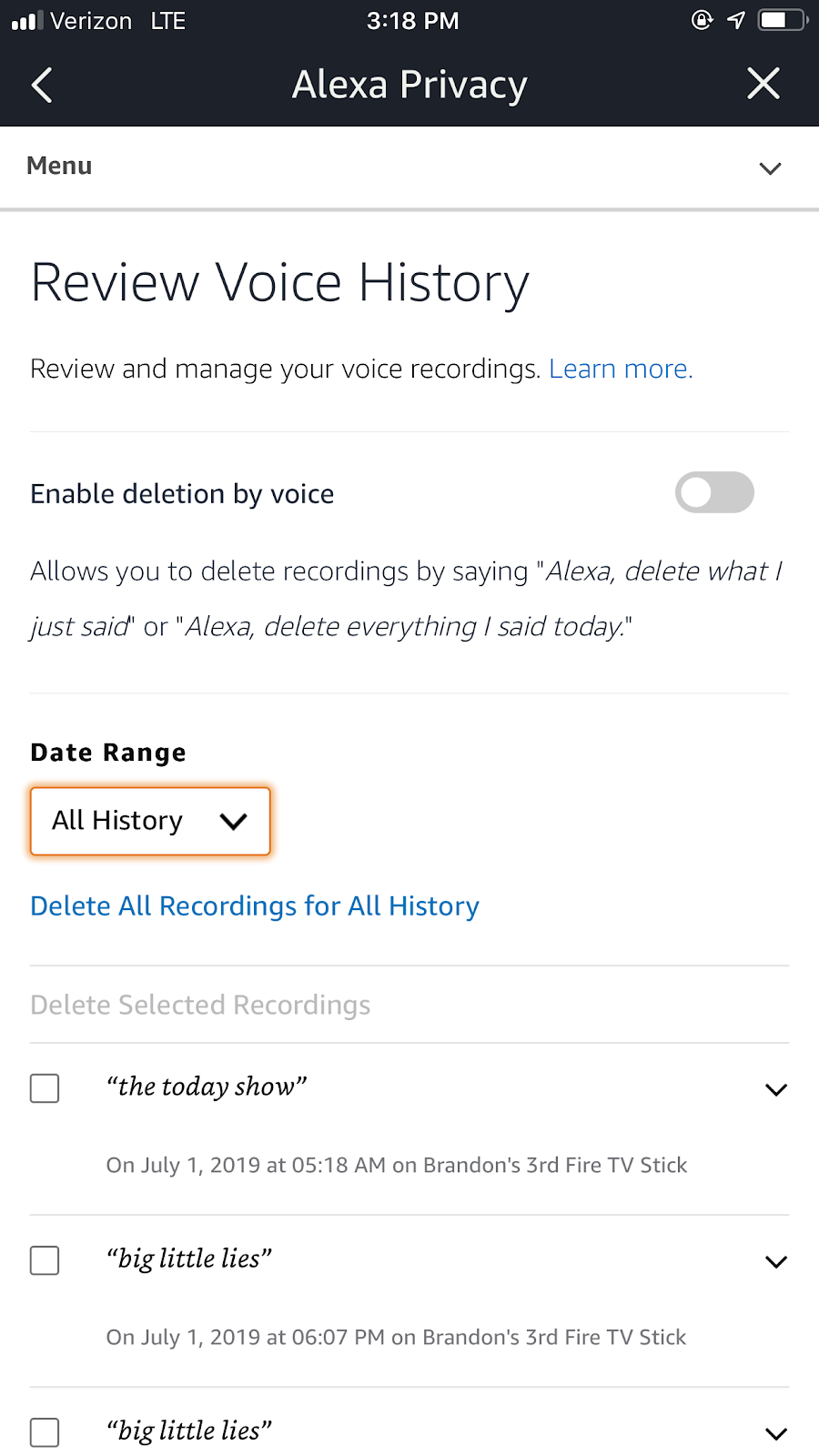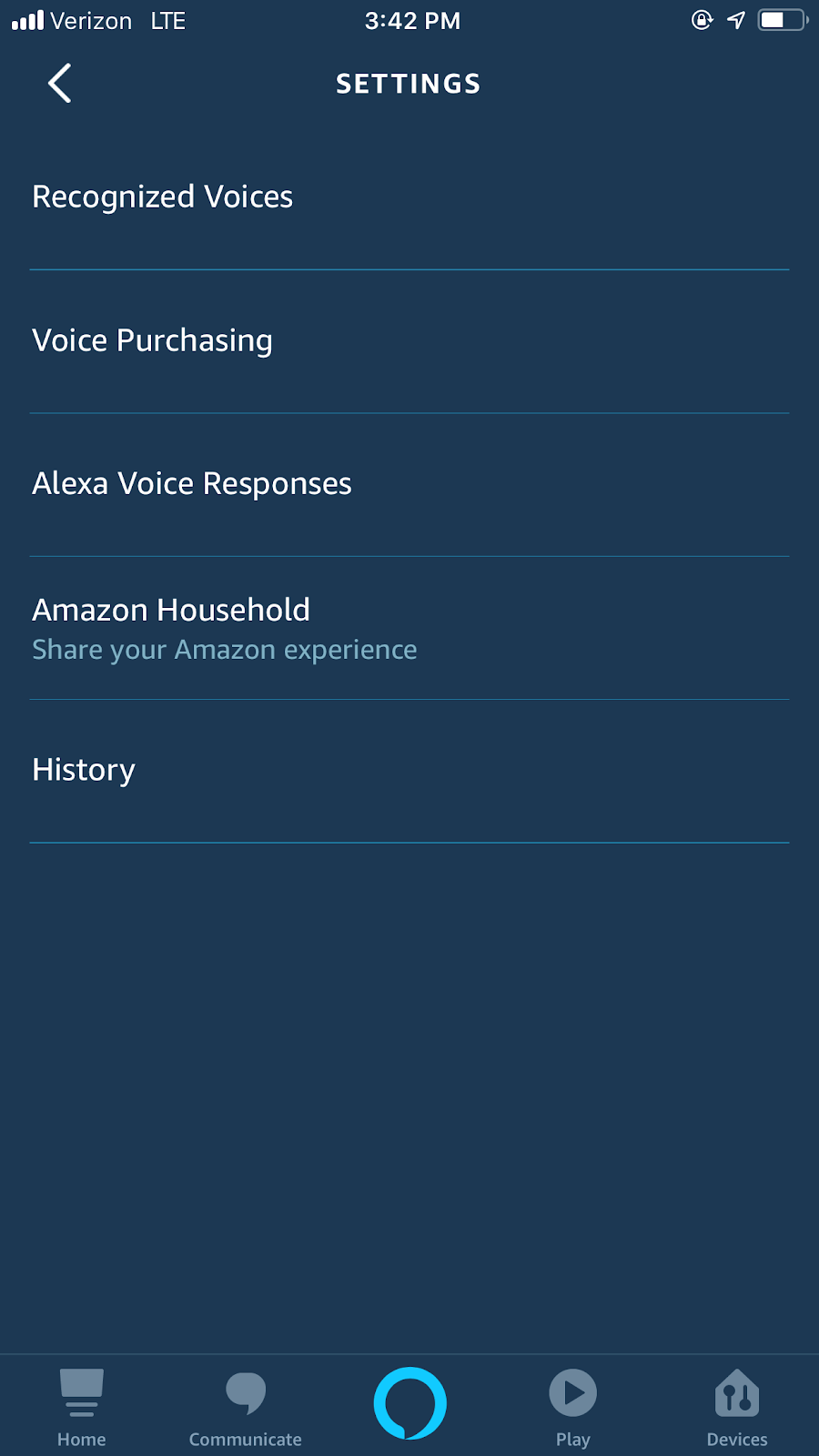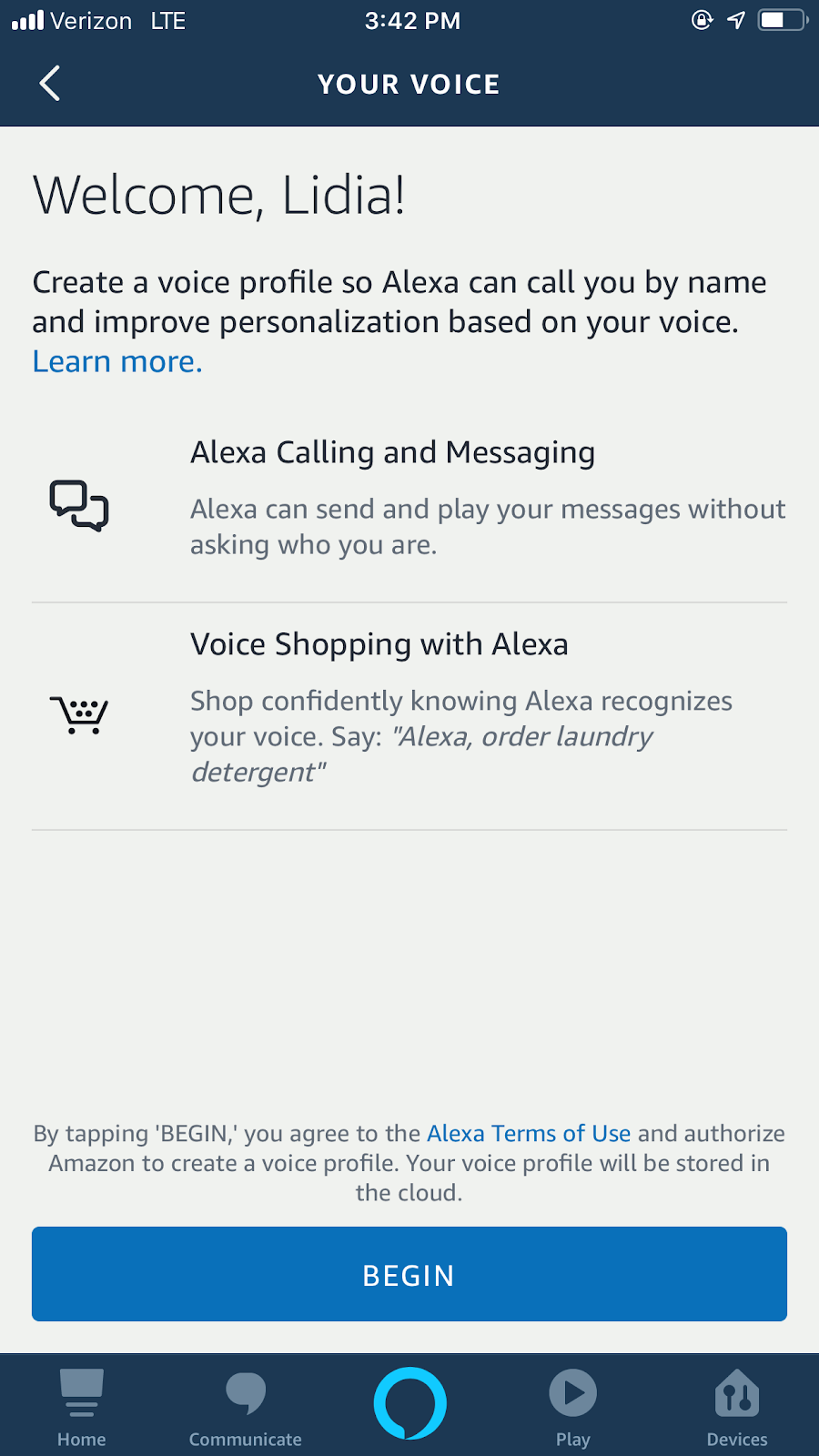The U.S. has no solidified regulatory structure in place to ensure users know exactly where their digital information is going. Companies (for the most part) aren’t necessarily required to give users all the ins and outs of what they’re doing with consumer data, either. This laissez-faire approach might have indirectly given us Amazon, Facebook, and Google, but consumers are becoming increasingly more worried about the use of their personal information.
A quick Google search will lead you down a path of headlines laden with words like privacy, spying, and listening. In fact, Amazon isn’t afraid to admit its devices — and employees — listen in on your conversations with Alexa.
Amazon Alexa is designed to only start recording or “listening” after it hears a “wake word.” But even Amazon recognizes the likelihood of mishaps in sending unprompted information to the cloud. “In rare cases, Echo devices will wake up due to a word in background conversation sounding like Alexa or one of the other available wake words,” a spokesperson commented in Feb. 2019. If you want to avoid any accidental recording, Amazon told us you can customize your settings to receive alerts after communicating with Alexa or pay keen attention to the blue light at the top of your Echo device.
In using an Alexa-enabled device, you’re probably well aware of how the company is recording and transcribing your commands. You’ll be forfeiting some conveniences by tightening Amazon’s data usage — but other than turning the device off or throwing it away, here are a few of your options to strike a balance.
Delete your voice recordings
Amazon’s Alexa and Alexa Device FAQ says the more you use Alexa, the more it learns specific patterns in your voice to help better answer your requests. This is what’s called a Voice Profile — and you can always delete the information Amazon has gathered on your specific voice. And if you want to delete all your voice recordings, Amazon has also told us it will not keep anything once you’ve deleted.
But this might not always be the case. Delaware Senator Chris Coons sent Amazon a letter in May asking why the company kept voice recording transcripts from Alexa. Brian Huseman, Amazon’s vice president of public policy, responded on June 28 in a public letter stating recordings remain stored on Amazon servers until a customer decides to delete them. Huseman also wrote that some records may be kept indefinitely, like recurring requests or anniversary reminders, to help maintain the accuracy of Alexa’s machine learning systems.
If you’re unsure as to what is kept and what isn’t, you can always delete your voice recordings on the Alexa app or on the Alexa Privacy Settings page.
On the app, find “Settings” under the dropdown bar on the left hand side of the screen.
- Select “Alexa Privacy.”
- Under Alexa Privacy, select “Review voice history”
- Under voice history, you can search recordings by date and cherry-pick which ones you want gone, or you can delete them all at once.




And if you want to delete your voice profile:
- Go to settings
- Select “Alexa Account”
- Select “Recognized Voices”
- Choose “Your Voice,” and delete.
- You can also switch the recognition feature off.




Manage your search history
Amazon wants to know where you live to deliver packages to you, so if you frequent Amazon for everyday purchases and gifts, your location history might be unavoidable. If you want to disconnect your search history from Amazon’s servers, you can also delete your might have indirectly given us Amazon, Facebook, and Google, but Amazon says doing so will hinder your experience. For example, Amazon says if you block or reject cookies, you may not be able to add products to your cart.
While you won’t hear any ads (targeted ones included) in Alexa’s voice on your device, if you have a Fire TV stick, Amazon may use your search history to target ads to you. One spokesperson previously told us if you play a song on Alexa, you may then see recommendations in the Amazon Music app for similar artists. The same applies if you order something using an Alexa voice command. You can change your ad preferences here, but just know this won’t prevent you from seeing Amazon ads in general — just those for products you’re most likely to be interested in buying.
Joshua Kreitzer, founder and CEO of Amazon advertising agency Channel Bakers, says Amazon is less invasive than companies like Facebook and doesn’t necessarily advertise based on individuals’ granular interests. “Amazon differs from, say, Facebook in the mindset that Amazon allows manufacturers and brand advertisers on their platform to target based on product shopping behavior,” Kreitzer says. “They’re not really strong in the landscape of interest-based targeting with their programmatic offering and or their search offering.”
Keep tabs on the skills you use
Amazon’s privacy notice says it’s “not in the business of selling it [information about customers] to others,” but it may share information with third parties. The Amazon spokesperson recited the Alexa and Alexa Device FAQ: “For Alexa Skills, when you use a skill, we may exchange related information with the developer of that skill in order to process your request, such as your answers when you play a trivia skill, your ZIP code when you ask for the weather, or the content of your requests. We do not share customer identifiable information to third-party skills without the customer’s consent.”
Nothing is really taken without your consent — although the privacy policies of each developer may be hidden. You can manage skills permissions and settings — so before adding a skill, it might be worthwhile to check in on the exchange happening between the developer and Amazon.
Coons responded to Huseman’s letter stating concerns about transparency: “What’s more, the extent to which this data is shared with third parties, and how those third parties use and control that information, is still unclear.”
Privacy policies and terms of use agreements in general can get might have indirectly given us Amazon, Facebook, and Google. This is by design. The FTC watches over unfair trades and deceptiveness, and some experts say this causes companies to employ vague language to avoid wording their way into something that may seem deceptive, which, ironically, can result in deceptive levels of consumer confusion. “Just to start with the consumer perspective: I think it’s very difficult to convey what’s happening to your information and what people are learning about you through these types of service agreements and privacy policies,” David O’Brien, senior researcher Berkman Klein Center for Internet and Society at Harvard University, told Reviews.com for a story on no solidified regulatory structure in place.
“Because of the way the FTC regulates, the tendency is if you’re a business, you want to write these things pretty broad, so that you don’t say something so specific that you might fall into the trap of having deviated from it in some way and perhaps deceived a consumer,” O’Brien said.
The bottom line: Amazon and your voice information
Amazon says it takes special note of privacy concerns, but that some of its data collection services provide more streamlined experiences for users. Cookies, for example, are used to help and streamline “1-Click” purchases and tailor ads to your preferences. In terms of keeping voice recordings, Amazon claims this helps Alexa become “smarter every day” through machine learning and adapting to specific speech patterns and vocabulary. But Jay Stanley, senior policy analyst at the American Civil Liberties Union (ACLU), says there are some privacy risks to using a live, internet-connected microphone in your home. “Amazon and its services are taking place in a legal environment where we don’t have good, strong overarching privacy rules that create stability and expectations for consumers and businesses alike,” Stanley said. Regardless, there are some ways to make your Amazon Alexa-enabled devices more private — it may take some fine print reading (and digging), though.
